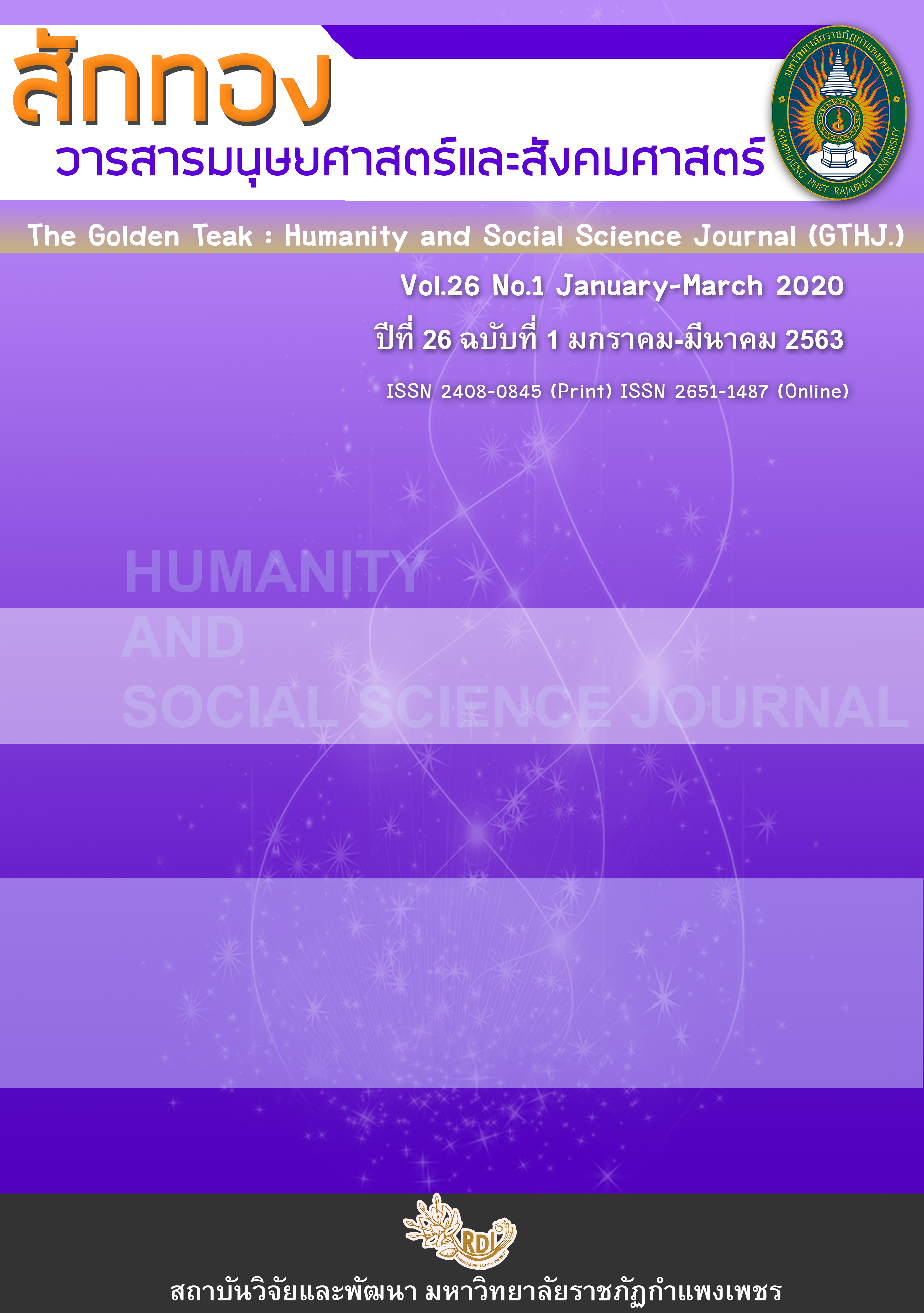An Analysis of Language Meta-functions in Clause Complexes from EFL Thai Upper Secondary School Students’ Personal Experience Recount Writing Products : SFL Perspective
Main Article Content
Abstract
This paper aims at presenting the results of language meta-functions analysis in clause complexes from personal experience recount texts of the six selected EFL Thai upper secondary school participants, selected from the results of pretest writing analysis and the English subject grade point average report of the school’s academic staff. With respect to the case study method, 26 Mattayom Suksa 5 in the math and science program students in the 2nd year of high school education were from the purposive randomization from the 6 classes of Mattayom Suksa 5 at the school. This selection made 2 high students (HS1, HS2), 2 middle students (MS1, MS2), and 2 low students (LS1 and LS2). The class was conducted through Systemic Functional Linguistics (SFL) genre-based approach at Hunkhapittayakom Secondary School, Hunkha District, Chainat Province, Thailand in the second semester of the academic year 2015 (Mingsakoon, 2018a; 2018b). The above-mentioned participants’ certain clause complexes in the personal experience writing work were analyzed through the framework of clause complex construction and the meaning making with the language meta-functions in SFL. It revealed that the complex clauses the students constructed in the personal experience recount writing work were made communicably, and the structures of those clauses were complicated under the layers of interdependencies (paratactic and hypotactic relations) and logico-semantic relation serving to the sources of meaning making in the language meta-functions in personal experience recount genre described in the school’s curriculum.
Article Details
บทความที่ได้รับการตีพิมพ์เป็นลิขสิทธิ์ของวารสาร สักทอง : วารสารมนุษยศาสตร์และสังคมศาสตร์ สถาบันวิจัยและพัฒนา มหาวิทยาลับราชภัฏกำแพงเพชร
ข้อคิดเห็นใดๆ ที่ปรากฎในวารสารเป็นวรรณกรรมของผู้เขียนโดยเฉพาะ ซึ่งมหาวิทยาลัยราชภัฏกำแพงเพชรและบรรณาธิการไม่จำเป็นต้องเห็นด้วย
References
Downing, A. & Locke, P. (2006). English Grammar. A University Course Second Edition. London and New York : Routledge Taylor & Francis Group.
Droga, L. & Humphrey, S. (2003). Getting started with funtional grammar. Berry : Target Texts.
Eggins, S. (2004). An Introduction to Systemic Functional Linguistics. London : Continuum.
Feez, S. (2002). Heritage and innovation in second language education. In A.M. Johns, et al.
(Eds.), Genre in the classroom (pp. 47-68). Mahwah, NJ : Erbaum.
Gerot, L. & Wignell, P. (2001). Making sense of functional grammar. Goal Coast : AEE Publishing.
Halliday, M.A. (1985). Introduction of functional grammar. London : Arnold.
________. (1994). An introduction to function grammar. (2 nd ed.). London : Edward Arnold.
________. (2007). Applied linguistics as an evolving theme. In J. Webster (Eds.), Language in Education (pp. 1-19). London : Continuum.
Halliday, M.A. & Matthiessen, C. (2014). An Introduction to Functional Grammar. London : Hodder Arnold.
Martin, J.R. (1997). Analyzing genre : Functional parameters. Institutions : Social processs in the workplace and school (pp. 3-39). London : Cassell.
________. (2001). Language, Register and Genre. In A. Burns, & C. Coffin, Analysing English in a Global Context (p. 276). London : Routledge.
Martin, J.R. & Rose, D. (2003). Working with discourse. London : Continuum.
_______. (2008). Genre relation mapping culture. London : Equinox.
Martin, J.R. & White, P.R. (2005). The language of evaluation : Apraisal in English. London & New York : Palgrave Macmillan.
Rose, D. (2007). Interacting with text: The role of dialogue in learning to read and write. Foreign Language in China, 4(5), 66-80.
Mingsakoon, P. (2018a). Generic structure development on upper secondary school students’ personal anecdote recount writing texts through SFL genre-based
approach. Manuscript Submitted for Publication at the Journal of Sciences, Humanities, Social and Sciences, Rajabhat Phibulsongkram University, Pitsanulok,
Thailand.
________. (2018b, December). Development of secondary school students’ generic structure execution in personal experience recount writing texts through SFL
genre-based approach. Manuscript Accepted for Publication at the Journal of Advance in Language and Literary Studies, 9(6).
Thompson, G. (2014). Introducing functional grammar. (3 rd ed.). London and New York : Routledge.


